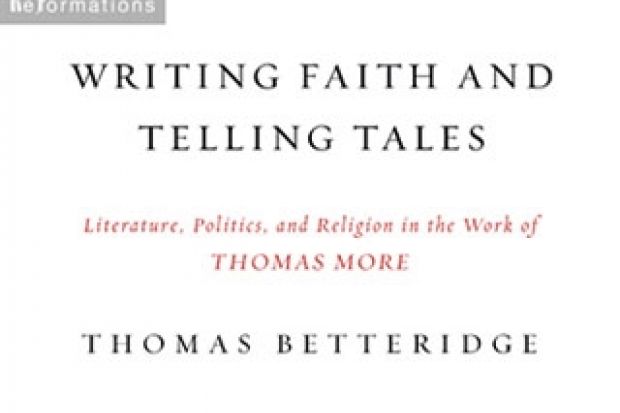I must begin with a confession. Much of Thomas Betteridge’s book remains a mystery to me. Its subject, Thomas More and his writings, has interested me for more years than I care to remember, and indeed at one stage I even considered writing a book about him myself. When I first became interested in More, his reputation could hardly have been higher. The standard biography remained that by R. W. Chambers, which presented More – the English statesman and philosopher executed on the orders of Henry VIII in 1535 and canonised 400 years later by Pius XI – in a favourable light. But much more important to the general public was Robert Bolt’s A Man for All Seasons, first a play and then in 1966 a film in which Paul Scofield, with that compelling voice of his, presented More in a most sympathetic light.
But even at the time some people worried that Bolt’s More was anachronistic, since it was difficult to believe that someone who had spent so much of his time denouncing heretics, even by some accounts torturing them, could really be a defender of the right of everyone to live according to his conscience. Moreover, in the late 1960s and 1970s, More’s reputation came under serious attack from Sir Geoffrey Elton, who in his efforts to present Thomas Cromwell as one of the most important figures of English history had somehow to explain away the fact that his hero had been greatly involved in the execution of the admirable person More had come to be seen as. Then came Richard Marius’ 1984 biography in which it was argued that More’s sexual hang-ups had turned him into a religious fanatic. More recently still came Hilary Mantel’s Man Booker Prize-winning novel Wolf Hall. Her portrait of More, seen in the novel through the eyes of Thomas Cromwell, is essentially a hatchet job; given the novel’s huge success, it is one that has now been read by hundreds of thousands of people.
For an admirer of More such as myself this is a sad state of affairs, so I was hopeful that a scholarly book that aimed to put More’s writings into a historical context could only be a good thing. Having read the book, however, I can only express great disappointment, and this despite the fact that in so far as I managed to follow his reasoning, Betteridge’s More is much nearer my own perception of the man than, say, Mantel’s. When at one point he very reasonably criticises the failure of so many historians to do justice to More’s polemical works against heresy, I almost found the effort needed to read this book worthwhile.
The problems, however, are many. For instance, in a text of only some 200 pages, not much more than half is devoted to More’s own works, which were numerous and often lengthy. Moreover, I came to question just how useful it was to compare, for instance, Chaucer’s The Nun’s Tale with More’s Richard III. Betteridge would argue that what he calls “the vernacular tradition of political writing” played an important part in More’s works, but it was surely much less important than More’s absorption in classical writings.
The real difficulty is the arcane language in which this book is written. For Betteridge, who is a professor of theatre, people do not just read, but have “reading strategies”, while apparently both Chaucer and More were interested in “the politics of reading”. Well, I am lost already, but then follows: “In Richard III texts circulate and are written, rewritten and unwritten in front of the reader. More forces readers to confront their desire for simple pleasures, for history that is black and white, by producing simultaneously a parodic moralistic history and one in which the moral is at best unclear, if not completely obscure.”
Obscure is certainly the adjective I would use to describe much of this book, the irony being that to be obscure was the last thing that More, with his “merry tales”, wished to be. It is a great pity. If one could only sit Betteridge down and ask him what he means by this or that sentence, one might learn a good deal, but alas, the reader is not able to do that.
Writing Faith and Telling Tales: Literature, Politics, and Religion in the Work of Thomas More
By Thomas Betteridge
University of Notre Dame Press, 2pp, £29.95
ISBN 9780268022396 and 075941 (e-book)
Published 29 November 2013
Register to continue
Why register?
- Registration is free and only takes a moment
- Once registered, you can read 3 articles a month
- Sign up for our newsletter
Subscribe
Or subscribe for unlimited access to:
- Unlimited access to news, views, insights & reviews
- Digital editions
- Digital access to THE’s university and college rankings analysis
Already registered or a current subscriber? Login





